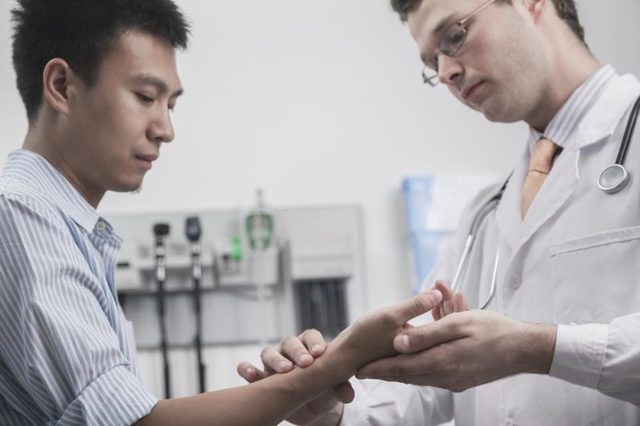Sexually promiscuous males who fail to use adequate protection during intimate encounters have a very high chance of contracting a sexually transmitted disease ("STD"). As the label implies, such disorders are primarily communicated via sexual contact. Treatment is available for many STDs. For others, however, no cure is currently available.
One of the STDs that medical practitioners frequently encounter is chlamydia. Chlamydia in men typically causes pain upon urinating. Among its other signs are burning or itching around the head of a man's penis, watery white or yellow and green discharge, and a constant urge to urinate. All such symptoms may not necessarily manifest themselves, however. In fact, it is very common for chlamydia in men to be totally asymptomatic. In fact, many men harbor "silent" chlamydial infections. This means that they are unaware of their illness. Even in cases of chlamydia in men which involve overt symptoms, between one and three weeks may elapse before they appear.
The most optimal means of preventing chlamydia in men is abstinence or self-indulgence by masturbation. If you decide to engage in sexual activity with another person, it's probably best to select a condom constructed of latex for maximum protection. This strategy is particularly advisable for those with numerous sexual partners. Do not engage in sex with numerous partners without adequate protection. Make an effort to determine the prior sexual history and current health status of any partners as well. Such precautions are the best preventive measures against chlamydia in men. The most commonly prescribed and home remedies for chlamydia for men is a variety of antibiotic medicines.
The proscribing healthcare providers will recommend a minimum period of ingesting periodic, level doses. During this time frame, patients should avoid sexual activity with other individuals. Failure to abstain does not only expose partner(s) to the risk of contracting the disease, but could also cause worsening of the patient's own condition through constant reinfection. If ignored or allowed to remain untreated for a prolonged period, chlamydia in men leads to severe, continuous pain and even permanent infertility.
Rare does unchecked chlamydia in men result in serious systemic health disorders like eye inflammations, arthritis, and swollen testicles. Its typical symptomology can be very uncomfortable and very disquieting, due to extreme suffering. Male chlamydia is easily detectible via urine sample testing or microscopic examination of a urethral swab sample. The disease has even been dubbed as "silent," due to its frequent asymptomology. Many men do not know that they are infected. Thus, they unknowingly transmit it to one or more sexual contacts, thereby perpetuating the vicious cycle of a major public health threat. In the process, their own health is jeopardized and seriously compromised.
The worst part of all is that an infected male is usually shocked to discover how serious and permanent the long-term effects of untreated chlamydia can be. As it is indeed a silent disease, chlamydia in men is also extremely dangerous. It can attack anybody off guard due to its asymptomatic nature. The best long-term line of defense that any man can employ to protect his health is to prevent infection in the first place. If, however, a man is unsure of whether he is really infected or have noticed any of the above symptoms associated with this STD, seek competent medical advice and appropriate testing immediately.
The most optimal means of preventing chlamydia in men is abstinence or self-indulgence by masturbation. If you decide to engage in sexual activity with another person, it's probably best to select a condom constructed of latex for maximum protection. This strategy is particularly advisable for those with numerous sexual partners. Do not engage in sex with numerous partners without adequate protection. Make an effort to determine the prior sexual history and current health status of any partners as well. Such precautions are the best preventive measures against chlamydia in men. The most commonly prescribed and home remedies for chlamydia for men is a variety of antibiotic medicines.
The proscribing healthcare providers will recommend a minimum period of ingesting periodic, level doses. During this time frame, patients should avoid sexual activity with other individuals. Failure to abstain does not only expose partner(s) to the risk of contracting the disease, but could also cause worsening of the patient's own condition through constant reinfection. If ignored or allowed to remain untreated for a prolonged period, chlamydia in men leads to severe, continuous pain and even permanent infertility.
Rare does unchecked chlamydia in men result in serious systemic health disorders like eye inflammations, arthritis, and swollen testicles. Its typical symptomology can be very uncomfortable and very disquieting, due to extreme suffering. Male chlamydia is easily detectible via urine sample testing or microscopic examination of a urethral swab sample. The disease has even been dubbed as "silent," due to its frequent asymptomology. Many men do not know that they are infected. Thus, they unknowingly transmit it to one or more sexual contacts, thereby perpetuating the vicious cycle of a major public health threat. In the process, their own health is jeopardized and seriously compromised.
The worst part of all is that an infected male is usually shocked to discover how serious and permanent the long-term effects of untreated chlamydia can be. As it is indeed a silent disease, chlamydia in men is also extremely dangerous. It can attack anybody off guard due to its asymptomatic nature. The best long-term line of defense that any man can employ to protect his health is to prevent infection in the first place. If, however, a man is unsure of whether he is really infected or have noticed any of the above symptoms associated with this STD, seek competent medical advice and appropriate testing immediately.


 RSS Feed
RSS Feed
